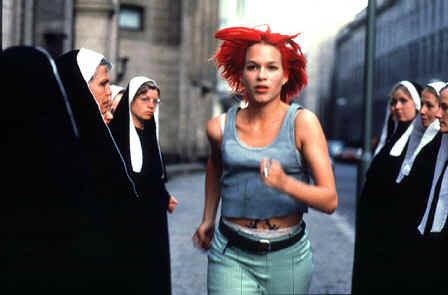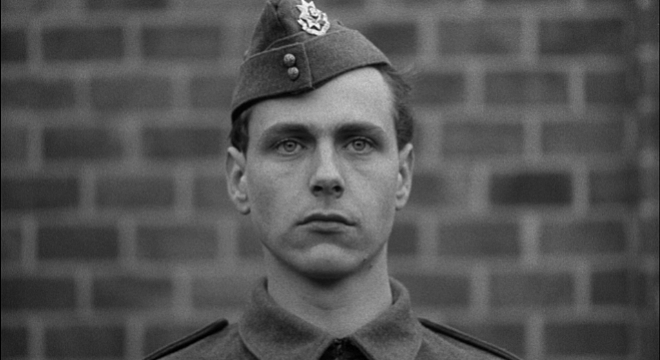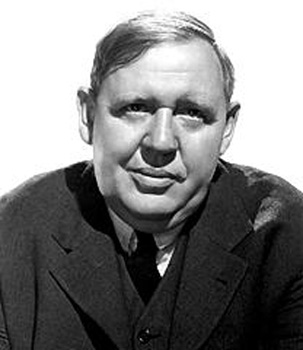In Tom Tykwer's Run Lola Run (1998; German title, Lola Rennt), the plot is set in motion when the fledgling criminal Manni -- Lola's lover -- bleeps up a drug deal and consequently has only 20 minutes to come up with 100,000 marks before the "bad dudes" duct tape him to the bottom of das u-boot. And it's up to Lola to get it for him. She has no money and no transportation, hence the running.
She knows she can't do this alone. The odds are against her. She has no prayer. Before she can help Manni, then, she needs someone to help her.
To whom does she turn? Faces of her friends and family flash before her as she becomes the lonely axis of an indifferent world revolving around her (by way of special effects is what I'm saying).
 |
| She persisted. |
I can relate.
The world is an uncaring place, really, and I am its hub, as are you, while it stubbornly turns in obedience to Nature's laws, one of which -- gravity -- assures us that we can race up or down any number of spiral staircases looking for help or a Better Place, but we ain't going nowhere.
And even if I could leave, there is no place to rest my weary, fearful head.
But that's just me, us, that's just now, this troubling epoch we find ourselves in in the Year of Our Lord 2017 when countless calls to seemingly reasonable leaders, our trusted shepherds, fall on deaf ears. (Scholars have given these non-responders the Latin title dubious rubious.)
God help us, we lift up our eyes only to see the Heavenless heavens, hosts only to tiny dots of light racing toward us and away from their long dead source at roughly 186,000 miles per second.
 |
| No one would help this guy, either: Marshall Will Kane (Gary Cooper) in High Noon (1952) |
A sense of abandonment, then, pervades the great and voluminous literature of the Victorian Age, reflecting a huge chunk of the population's fear that their Father had gone away -- shaking his head, as it were -- or, worse, had never existed in the first place.
But the Victorians persisted, endured and, in their own BBC-period-piece way, prevailed.
A few centuries before Run Lola Run, another tale about a desperate German girl circulated among the menschen, and we know it as "Hansel and Gretel."
That story, like many of Jesus' parables, utilizes the rhetorical strategy of "typification and reversal," as they call it on the streets: The teller begins with familiar types -- plots, characters, tropes, etc. -- that suggest an obvious, well-worn, comforting moral, then "reverses the anticipated destinies of the characters," thereby dashing the listener's expectations and replacing their carpet of complacency with one that flies.*
Early in Hansel and Gretel's quest, for example, the girl is the crybaby and the boy is the comforter, telling her repeatedly, "Do not cry. . . . The good God will not forsake us." We know what's coming: The courageous male will save the weak female.
 |
| Left to right: Hansel, Kellyanne Conway, Gretel |
But by the end -- spoiler alert -- Gretel is the savior, pushing the witch into an oven, then helping her navigationally challenged brother get back home, teaching him in the process that it was no longer possible for the both of them to ride on a duck's back.
So choose one: God did not forsake them; he worked through Gretel to save them. Or, God did not hear their cries, so Gretel took matters into her hands. Or God heard their cries, but . . .
Lola is a 20th-century Gretel: a damsel in distress, she is also figuratively an orphan: her mother's primary allegiances are to alcohol, her telephone and television, and maybe her hair ("SHAMpoo!"), and her father tells Lola he isn't her father. Here, Hansel and Gretel's parents are reversed: Lola has a wicked stepfather and an ineffectual mother.
The enigmatic bank guard refers to Lola as "our little princess," facetiously telling her "Courtesy and composure are the queen's jewels," evoking more familiar fairy-tale images.
Furthermore, she and Manni have no Fairy Godmother, no Wise Old Man as a mentor or a guide.
Lola's quest-driven plot, like Hansel and Gretel's, begins in scarcity, and ends in abundance. It's probably too much to claim that the "Hansel and Gretel" allusion is reinforced by Manni's trying to save them by robbing a grocery store -- a house of food? Right?
Lola, like Gretel, has to do the dirty work. Manni is neither her Prince Charming nor her Knight in Shining Armor. Like most men, he is an adolescent boy: impetuous, immature, half-cocked and self-centered. He is weak in faith. Not the stuff of heroes, my brothers!
Her victory comes from her will, her refuse-to-lose mentality, generated from her love (inexplicable, as always) for Manni. Does he believe in her? No.Trust her? No. Thank her? No. Since she loves him, does any of that matter? Hell no!
Her power comes to her incrementally, her three mad dashes creating an upward spiral (the film's dominant image). After her first run, she resurrects herself in the interest of unfinished business. In a scene set God knows where (Lola's hair isn't red, but the lighting is), she tells Manni, "I think I have to make a decision. . . . I don't want to leave. Stop!" And her second run begins. (And this time she knows how to work the safety on a handgun.)
 |
| A narrator tells us life is just fact and theory. Lola's interlude scenes (above) are theory. Note the spiral. |
A similar scene before the final run closes with Lola telling the dying Manni, "You haven't died yet," and off she goes.
 |
| Having just used a Vertigo shot, Tykwer pays homage to the film AND reinforces his spiral motif. |
And then . . .
Still desperate, still clueless, time flying at her back, Lola runs, her eyes closed, and in a voice-over we hear her say to an unnamed auditor, "Come on. Help me. Please. I'll just keep on running, okay? I'm waiting. I'm waiting. I'm waiting. I'm waiting." And still she runs. We know what Hansel would tell her: "The good God will not forsake us."
 |
| Yet another story here |
Like Gretel, she brings the jewels back home -- to a crossroads, actually. (The life-saving loot is in a golden bag. The one from the grocery-store heist was red; the one from the bank job was green. Discuss.)
I'm too sophisticated to draw a moral from this. And if yours is "It's simple: God helps those who help themselves," I reject it. No, Run Lola Run is a work of art, I'm sure of it, so it settles for telling the truth, and that's enough, and my friend Oscar Wilde told me "The truth is rarely pure and never simple."
Lola is an immoral outsider, a misfit, a loser, a huge disappointment to her parents, if they took the time to notice. Manni deals in illegal drugs. Neither are clean enough to sit at the table of respectability, let alone become legislators or bishops.
 |
| "After the game is before the game." |
But grace comes to them anyway, chiefly because a sweaty woman with her hair on fire, who isn't much of a runner, and who has no connections, persists any damn way, refusing to give up because she can't afford to.
Whether anyone is listening or not.
*For more info on this rhetorical device, see Robert W. Funk's Honest to Jesus and Steppenwolf's "Magic Carpet Ride."




















